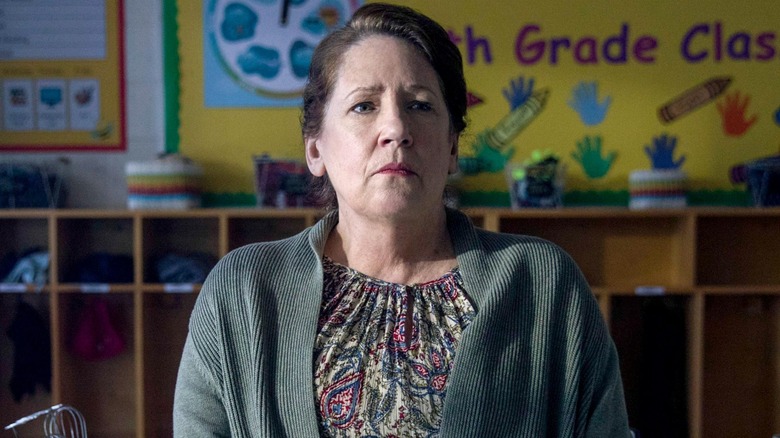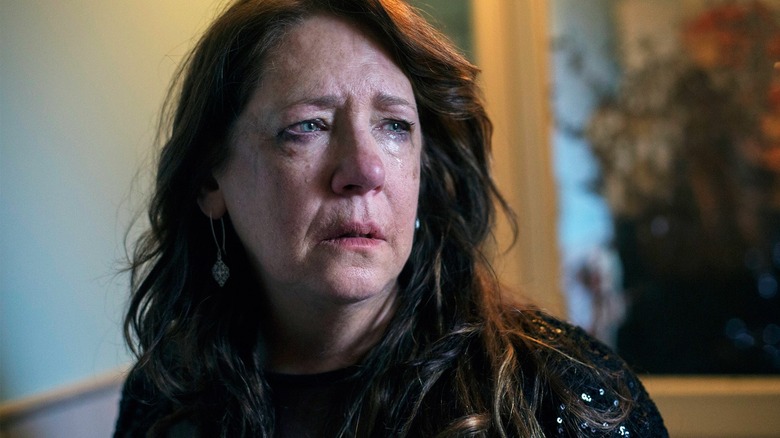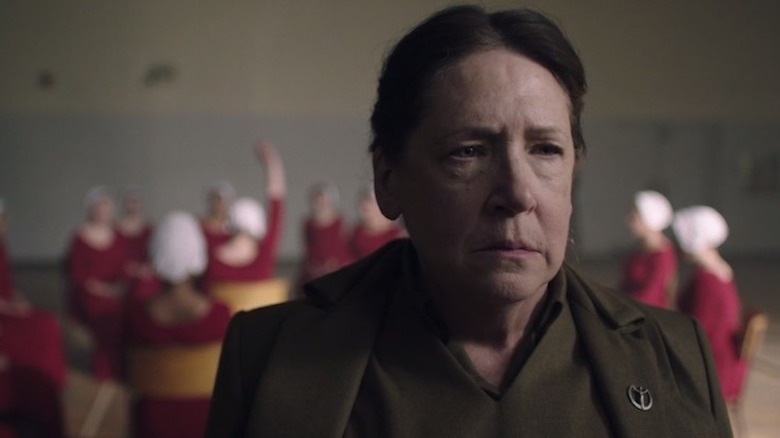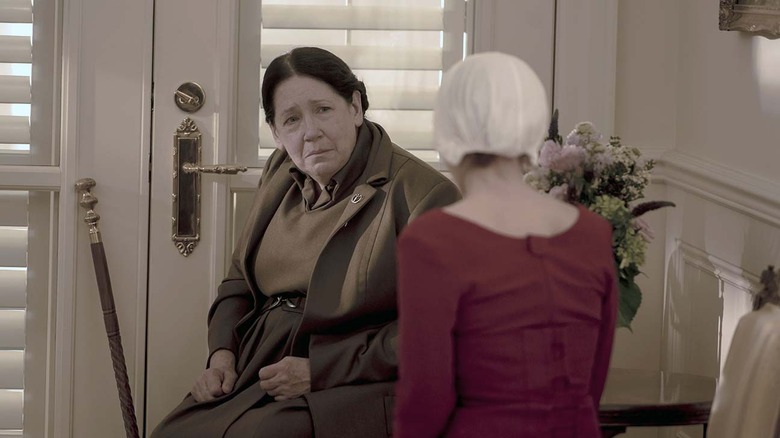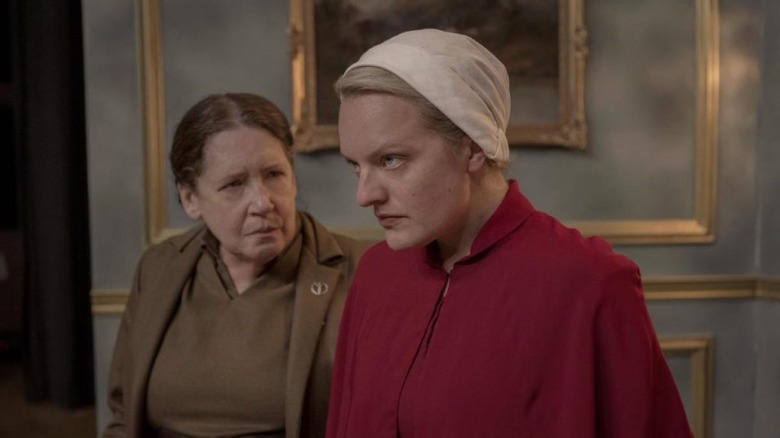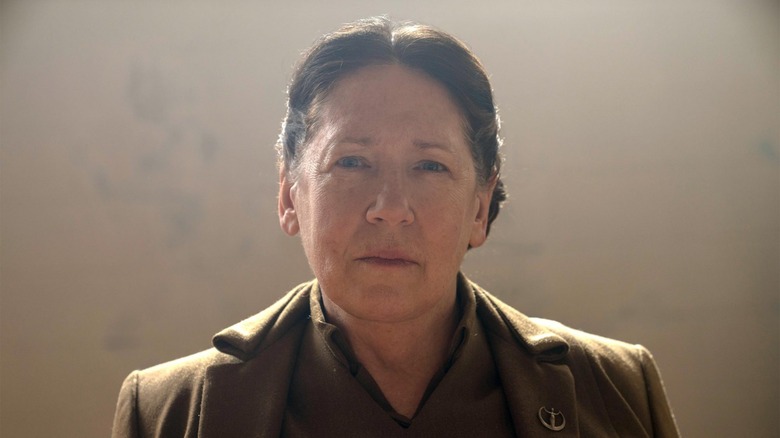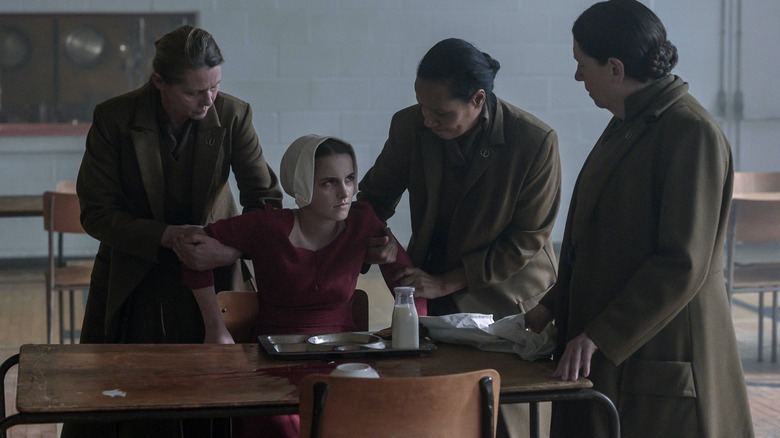Aunt Lydia's Handmaid's Tale Backstory Explained
When it comes to Gilead's villains, Aunt Lydia is among the worst of the worst. Played by Ann Dowd on "The Handmaid's Tale," Lydia has enraged and disturbed fans since the show kicked off in 2017. Dowd is so great at being bad that she has earned an avalanche of critical acclaim for her performance, even taking home an Emmy in 2017.
Unlike the Commanders, guards, and Eyes that make up most of Gilead's misogynist and totalitarian authority, Lydia is female. She's charged with training and disciplining Handmaids, women who are raped by Commanders in monthly "ceremonies," in the hopes of conceiving a child in an infertility-plagued world. Should these women not comply, Lydia has been known to sever limbs, order stonings, and gouge out eyeballs, among other monstrosities ... all while believing that she's serving God.
Still, even someone as heinous as Aunt Lydia has a backstory. Fans have gotten to know the character's history pretty well over the course of the show. Curious about how Lydia reached her position of power? Here's everything you need to know about the wretched Aunt's history.
Lydia Clements, fourth grade teacher
In the Season 3 episode "Unfit," we're introduced to a pre-Gilead Lydia Clements. As it turns out, Aunt Lydia was once an elementary school teacher with a background in family law. This Lydia wore her hair down, and was once married to a man. Even in this era, however, Lydia had some pretty judgmental morals, especially in terms of religion and how a "real" mother should act.
This is explored in full in the episode's flashbacks, which see Lydia befriend a young single mother named Noelle (Emily Althaus) and her son Ryan (Ian Ho). The episode follows the trio as they grow closer and even wind up spending Christmas together. However, Lydia frowns upon Noelle for packing chips for Ryan's lunch and arriving at school three hours late to pick him up. Still, she seems to revel in being called "Aunt Lydia" by the fourth grader.
"I think she, at that point in her life, really wants to help," Dowd said (via Vanity Fair) of the episode. "I think she probably got out of [family law] because it was too painful to see the separation, to see the loss."
Interestingly, until this episode, the only other time Lydia had ever alluded to her past was during Season 2's "Smart Power," in which she tells June (Elisabeth Moss) that she'd been godmother to her sister's child, but that said child had died.
Shame, shame, shame
Shortly after spending Christmas with Noelle and Ryan, Lydia goes on a date. In the middle of a make-out session with Jim (John Ortiz), the school principal she's been seeing, he suddenly wants to stop. Sure, he's into her, but as a widower, Jim thinks they're rushing things. Instead of understanding, Lydia flies into a mirror-smashing rage that results in her catching a glimpse of herself with make-up (gifted to her by Noelle) running down her face.
What exactly is Lydia going through here? As Ann Dowd explained to Vanity Fair, "I was raised in a strong Catholic home, you know — sex is a very, very tricky area. And there's a lot of guilt and a lot of shame associated with it ... I think what I loved about that moment is it said so much about how she was raised, and that, honestly, shame is in charge of her life."
In an act heavy with foreshadowing, Lydia's shame quickly turns to revenge, and she spends the rest of the episode doing everything in her power to separate Noelle from her son. She even calls Child Services and excoriates Noelle for being morally corrupt (in her view) and not bringing her son to church. In the end, Lydia winds up alone: Jim walks off in disgust after seeing her true colors. She justifies her actions by vilifying Noelle and telling herself that Ryan is better off with a nice couple who couldn't have their own children.
Lydia's role in early Gilead
Aunt Lydia uses fear to train Handmaids in becoming perfect birthing vessels. Specifically, she abuses her charges into sacrificing their bodies for the sake of God and Gilead. Dowd has a specific prayer (per Vanity Fair) that she believes describes her character: "Trust in the Lord with all your heart, and lean not on your own understanding. In all your ways, acknowledge Him and He will set your path straight." The Handmaids' horrific lives are divinely ordained, according to Lydia, and thus beyond feeble human doubt.
Flashbacks to the Red Center see Lydia training one of the first groups of Handmaids, including June, Moira (Samira Wiley), and Janine (Madeline Brewer). She is immediately set up as a villain who uses torture to get the Handmaids to comply. She doesn't think twice about removing Janine's eye, for example, when Janine resists becoming a Handmaid.
After the Handmaids are placed in homes, Lydia also serves as a liaison between Gilead authority and individual households. She frequently makes house calls to ensure that everyone is doing their part to populate the newly formed nation. In the first season, we see her make a handful of visits to the Waterford residence, where June has been placed. Lydia frequently asserts her power over June, and at one point even beats her with a cattle prod before the Commander's wife, Serena Joy (Yvonne Strahovski), stops her, as they believe June has become pregnant.
Training Handmaids
Lydia is responsible for devising many of Gilead's controversial "training" techniques, which include ordering Handmaids to hold rocks for hours in the rain, getting them to kill "traitors" in blind rages, and making them believe they're about to be hanged. She also orders, orchestrates, or oversees nearly all of the physical mutilation that has happened over the course of the series, including removing Janine's eye and performing female circumcision on Emily (Alexis Bledel) for being a "gender traitor."
When she isn't disciplining Handmaids with physical violence, Lydia is the ultimate gaslighter. She twists women psychologically in a variety of ways, including victim-blaming Janine and forcing other women to go along with it. She also manipulates her charges into believing that the only way they might receive true love is by being "good girls" — meaning obedient, quiet, and utterly debased.
Lydia is also emotionally abusive towards June, and is quick to shame her into believing that the actions of her pre-Gilead self are what bring harm to others, including their deaths. It's all done in a bid to keep June compliant, which works — but only for a while.
Aunt Lydia cares ... sort of
Lydia refers to the Handmaids as her "girls." She takes a particular liking to Janine, and believes she's saved her from a worse fate. In fact, Lydia often paints herself as the Handmaids' protector, and is quick to blame herself when they fail. She cares ... but only in a certain sense. "At the core of her choices, she loves these girls deeply and wants them to succeed in this new world, and she is keenly aware that if she doesn't get them to get the drill immediately, they are not going to make it," Dowd explained during a Television Critics Association (TCA) press conference in 2017.
This twisted motherliness is apparent in Season 1's "A Woman's Place:" When Serena tells Aunt Lydia to remove Janine from an important dinner because of her missing eye, Lydia sympathizes with Janine. But in the season finale, she proves that Gilead is still first in her heart when she orders the other Handmaids to stone Janine to death. The Handmaids, led by June, refuse. Rather than let the guards shoot the lot of them for their disobedience, Lydia begs them to spare the Handmaids, as she is responsible for them and will punish them herself. In Season 2, it is revealed that Lydia sent Janine to the Colonies, and punished the Handmaids with a mock execution.
Aunt Lydia and Emily
Emily suffers greatly at Lydia's hands. Lydia has Emily's lover murdered, forces Emily to undergo clitoridectomy, and sends Emily to the Colonies in Season 2. Lydia eventually brings Emily back, because they're short on Handmaids, and pairs her with Commander Lawrence (Bradley Whitford). Finally, in the Season 2 finale "The Word," Emily snaps and stabs Lydia in the back. While Lydia survives, the event changes her, making her an even harder character.
"She thinks there's love between her and her girls," show creator Bruce Miller said (via Forbes). "The fact that one of her girls has literally stabbed her in the back, I think that alters your workplace feelings on a day to day basis ... I think in her case, it makes her double-down. She feels like she just wasn't strong enough in her discipline. So, she has decided it's time to get tough."
Lydia can't take her feelings out on Emily in Season 3, as she manages to escape Gilead. Instead, Lydia comes down even harder on the remaining Handmaids. Eventually, the pressure gets to her, and she snaps after an emotionally unstable Janine begs to return to her former family (and the daughter she birthed). Lydia beats her mercilessly in front of a crowd, only stopping when June comes between them, allowing Lydia to (somewhat) regain her senses.
Aunt Lydia and June
The relationship between Lydia and June has always been tumultuous. They grow closer in Season 2 as a pregnant June leans into Lydia, in the hopes of playing her against the Waterfords. June wants to protect her unborn baby, while Lydia hopes that June will be one of her success stories. During this time period, we learn that Lydia has a certain amount of power over the Commanders and their wives as well, as she is tasked with recording the mood in the home and evaluating whether the household is a good fit for a child.
The short-lived peace between June and Lydia doesn't last, however. When June betrays Lydia by orchestrating baby Nichole's escape, Lydia comes down hard on her in Season 3. She forces June to participate in propaganda videos with the Waterfords, who are pleading for the return of Baby Nichole, and even accompanies the family on a trip to Washington. While there, she is devastated at the sight of Handmaids whose mouths have been sewn shut.
Lydia is very much aware that June's biggest weakness is her daughter, Hannah, who was taken from June when Gilead assumed power. In Season 3, after June tracks down Hannah, Lydia orders the execution of the Martha who helped June connect with her daughter. In a cruel twist, Lydia forces June and the other Handmaids to be the ones to execute her.
Lydia's need for revenge
After June helps a planeload of Gilead children flee to Canada in the Season 3 finale "Mayday," Lydia comes under fire. As a result, Lydia makes it her mission to find and reform June. "Lydia in this season [is in] a Javert kind of position where she is just obsessed with June and has so much of her personal worth tied up in what June is doing," Miller said during a 2021 TCA press conference.
When June is brought in during the Season 4 episode "The Crossing," Lydia orders her to be tortured until she reveals where her fellow escaped Handmaids are hiding. Eventually, Lydia (with the help of Commander Lawrence) uses Hannah as a bargaining chip, which gets June to talk. Rather than kill her, Lydia concocts a plan for a colony where June and the other Handmaids will live and be visited by Commanders.
When the truck bringing the women to the colony stops for a train, however, June overpowers Lydia. She and Janine escape while the other Handmaids are killed as Lydia watches in horror. "Although [June and Lydia] are kind of enemies in this story, they are inextricably linked. They spend a ton of time thinking about the other one and what the other one is doing," Miller said. "So it's fascinating to have two people who really would like to be both rid of each other but who are tangled up with each other all the time."
Fighting to get her power back
In the Season 4 episode "Chicago," it's clear that Aunt Lydia is no longer in Gilead's good graces, given that June has once again escaped. For the first time, we see Lydia's living quarters, which include a sparse room and a communal area reminiscent of a retirement community. We also learn that she is expected to spend the rest of her days doing puzzles and playing cards with her fellow Aunts. However, Lydia wants her power back and is not interested in being forced into an early retirement.
So, Lydia strikes a deal with Commander Lawrence: She'll give him dirt on his follow Commanders, which he will, in turn, use to bribe his way back into power. What does Lydia want in return? To head up the training of a new crop of girls, for starters. But more importantly, she wants to be the one to punish June if and when she is finally caught.
Aunt Lydia's future
While Lydia's future within the world of Hulu's "The Handmaid's Tale" remains unwritten, Margaret Atwood took matters into her own hands with her 2019 novel, "The Testaments." A sequel to her original "Handmaid's Tale" novel, "The Testaments" is written from three female characters' perspectives, including Aunt Lydia's. It takes place 15 years after the events of the celebrated novel, which roughly encompass the first season of the show.
In this sequel, Atwood reveals that at the start of Gilead's takeover, Lydia was rounded up like so many other women were. She was detained, tortured, deprived of food, light, and answers, and eventually given a choice: Cooperate or face the consequences. Lydia sees herself as someone who did what she had to do in order to survive. Eventually, she becomes integral to the fall of Gilead.
How much this novel will affect the future of the show remains to be seen. Atwood's Lydia is a very different character in many respects: Lydia of the books was a judge before Gilead took power, and acts as a committed and experienced mole for Mayday in "The Testaments." For now, one thing is sure: Aunt Lydia will definitely go down as one of the most compelling TV villains of all time.
Dealing with June's escape
Even though she's a villain, Aunt Lydia has faced her own share of scary moments over the course of the show. Those incidents 100% caught up with her in Season 4 after she and Commander Lawrence struck a deal to get her back in power. While Lydia seemed happy to be back in charge at first, after she learned June had escaped to Canada she quickly spiraled out of control. In Episode 8, "Testimony," she got a little too liberal with her cattle prod for no apparent reason, and even attacked a fellow Aunt.
"She holds herself responsible. So do the commanders. She knew something was happening. She knew it. And she did not follow it to its core," Dowd told Elle of Lydia's mindset. "And June, whom she has a tremendously complicated relationship with, pulled it off. So there's that personal factor where she's being tough on herself because she knows all of that, and also desperate to prove that, 'No, no, no, I'm not irrelevant.'"
Reuniting with Janine
While Lydia lost June, she had the chance to reform Janine once and for all when Janine was captured following the Chicago bombings in Season 4. Following Lydia's outburst in the "Testimony" episode, Commander Lawrence told her to take her anger and frustration out on Janine, whose life no longer mattered to the higher-ups.
In a rare moment of weakness, Lydia reunited with Janine and actually heeded her request not to be returned "to service." Instead Lydia decided to keep Janine close to her and protect her at the center by putting her to use with chores instead. At first the other Aunts questioned why Lydia wasn't doing God's work and putting Janine back into the field, but Lydia found good use for her before long.
In the fourth season's "Progress" episode, the former Mrs. Keyes (Mckenna Grace) resurfaced, this time as the handmaid Esther. Rather than submit to the Red Center demands, Esther mounted a hunger strike that none of the Aunts could stop. So when Janine asked for a chance to explain the situation to Esther, Aunt Lydia conceded. In the end Janine was able to convince Esther that worse things were in store for her than death, solidifying Aunt Lydia's trust in Janine and position of power among the other Aunts in the process. At least for now.

